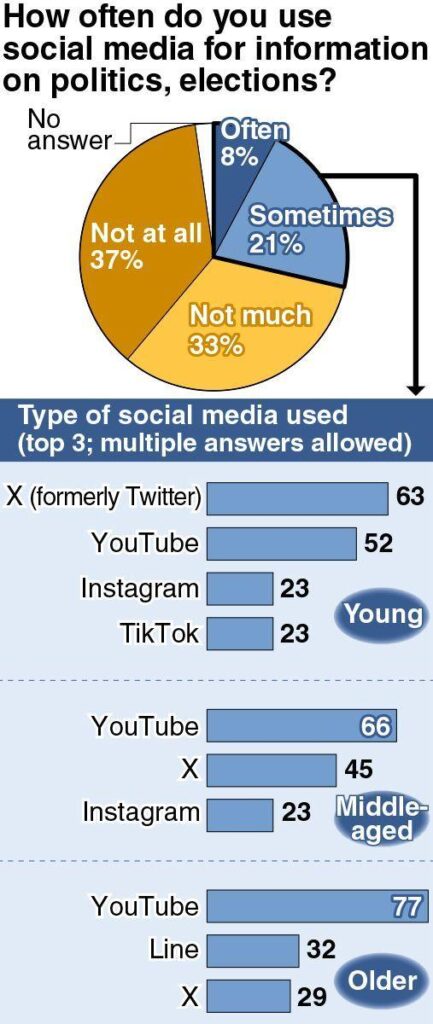In recent years, social media has become an increasingly influential force in Japan’s political landscape, transforming how politicians communicate, how citizens engage, and how information is disseminated. Platforms such as Twitter, Facebook, and LINE are breaking traditional barriers, enabling new forms of political participation and debate. However, alongside these opportunities come challenges, including the spread of misinformation, polarization, and concerns over privacy. This article explores the multifaceted impact of social media on Japanese politics, examining whether its rise is ultimately strengthening democracy or presenting new risks for the country’s political future.
Social Media Amplifying Youth Engagement and Political Discourse in Japan
In recent years, digital platforms have revolutionized the way young Japanese citizens engage with political content, creating new avenues for participation and activism. Social media, with its dynamic and interactive features, offers a space where youth voices can flourish beyond traditional media constraints. Platforms like Twitter and LINE have become hotspots for political mobilization, allowing younger demographics to share opinions, organize movements, and challenge established norms. This has led to increased awareness on issues such as climate change, economic inequality, and human rights, often catalyzing offline actions.
However, this newfound digital empowerment comes with complex challenges:
- Echo chambers: Algorithms tend to reinforce existing beliefs, limiting exposure to diverse viewpoints.
- Misinformation spread: The rapid circulation of unverified information can distort public discourse.
- Superficial engagement: Quick reactions and shares may substitute in-depth understanding and long-term commitment.
| Platform | Primary Youth Activity | Political Impact |
|---|---|---|
| Hashtag campaigns & debates | Real-time issue spotlighting | |
| LINE | Group discussions & event planning | Mobilizing local communities |
| Visual storytelling & influencer outreach | Shaping public opinion through visuals |
The Challenges of Misinformation and Digital Echo Chambers in Japanese Politics
The rapid spread of misinformation has become a pressing issue within Japan’s political landscape, with social media platforms acting as both catalysts and echo chambers. False narratives and unverified claims often circulate unchecked, amplifying polarizing opinions and sowing distrust among citizens. This phenomenon poses significant challenges for politicians and media outlets striving to maintain a credible discourse, as the line between fact and fiction blurs. Moreover, algorithm-driven feeds tend to reinforce existing beliefs, creating digital bubbles that limit exposure to alternative viewpoints and fuel ideological division.
These digitally entrenched echo chambers skew public perception and complicate efforts to engage in constructive dialogue across party lines. The consequences are multifaceted:
- Reduction in political pluralism as users gravitate towards homogenous networks
- Heightened susceptibility to politically motivated misinformation campaigns
- Challenges for traditional media in debunking false information swiftly and effectively
| Impact | Description | Example |
|---|---|---|
| Polarization | Divergence of public opinion into opposing camps | Online debates becoming increasingly hostile |
| Misinformation Spread | Rapid sharing of inaccurate political claims | Misreported election data causing confusion |
| Distrust in Institutions | Skepticism toward government and media sources | Decline in voter confidence and turnout |
Strategies for Promoting Media Literacy and Responsible Online Political Participation
Enhancing media literacy in Japan requires a multi-faceted approach that empowers citizens to critically evaluate online information and recognize biases, misinformation, and propaganda. Educational institutions are increasingly incorporating digital literacy curricula that emphasize fact-checking, source evaluation, and the ethical use of social media platforms. Community-driven initiatives, such as workshops and public forums, also play a crucial role in equipping older generations and disenfranchised groups who may be more vulnerable to online manipulation.
Moreover, fostering responsible online political participation depends on collaboration between government, tech companies, and civil society. Key strategies include:
- Transparency measures: Platforms should disclose political ad funding and algorithmic decision-making processes.
- Promotion of verified information: Prioritizing content from credible sources to counteract viral falsehoods.
- Encouraging respectful dialogue: Establishing community guidelines that discourage harassment and polarization.
| Strategy | Primary Focus | Expected Impact |
|---|---|---|
| Digital Literacy Programs | Education & Awareness | Empowered, critical-minded users |
| Platform Transparency | Accountability | Reduced misinformation spread |
| Community Moderation | Safe Discourse | More constructive political debates |
To Conclude
As social media continues to embed itself into the fabric of Japanese society, its impact on the nation’s political landscape remains profound and multifaceted. While platforms offer unprecedented opportunities for engagement and transparency, they also pose challenges related to misinformation and polarization. Japan’s experience underscores a broader global trend, highlighting the need for balanced approaches that harness social media’s potential while mitigating its risks. As politicians, citizens, and regulators navigate this evolving digital terrain, the future of Japanese politics will increasingly be shaped by how these powerful tools are wielded-for better or worse.




